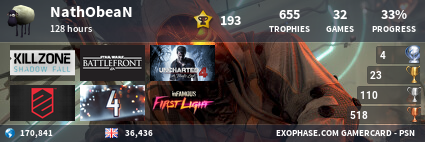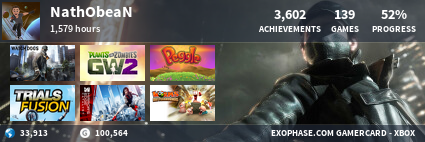It doesn't matter to me as long as the frame rate is stable. Yet I hardly notice when a game drops from 60 to 40, a 30 to 20 drop is much more noticeable. Micro stutters stand out more in 60 fps games though.
I did notice some slowdown on Fallout 4 last night, didn't matter to me. I wouldn't want the game to drop to 720p for better frame rate. It's more important to be able to see what's coming for me from the distance.
There are many factors involved of course. If the game adds heavy full screen motion blur and temporal AA than 60fps is definitely preferred to limit the amount the image is blurred by the effects. Adding full screen notion blur is imo the worst solution to 'improve' perceived frame rate.
It also depends on your max turn rate. On PC you can turn as fast as you want with mouse look, the faster you turn the higher the fps you need to keep the image stable. There are strict guidelines for movies for how fast the camera can pan at 24 fps. Which is also why 60 fps is more important for fast sidescrollers and 2D platformers.
There are 2 things involved for perceiving fluid motion, besides frame rate, the size of the steps things take across your visual field also play an big factor. Which is another reason why it's more important for traditional PC gaming where you sit closely in front of a monitor. The bigger fov the image takes up, the bigger the steps are at which things jump across your visual field. And conversely, flying straight high above the landscape in flight simulators looks perfectly fluid at 20 fps.
Racing is my favorite genre and I have played well over a hundred of them through the years at all kinds of frame rates. Maybe not a popular view, yet for sim racers 30 fps is enough for me. You don't turn that fast, and it's more important to have the best view of the track ahead.
For fast arcade racers 60 fps is better with unpredictable movement, spinning out, crashing and all kinds of stuff flying at you. DriveClub is an interesting case. For the cars 30 fps is fine. Yet with the bikes it's a bit low in first person mode. You have to be careful not to throw the bike around too fast. The added rotational movement makes the difference between 2 frames a bit too much for 30 fps to be comfortable. (I play with a high fov on 92" screen so it's more noticeable) The same goes for Wipeout in 1st person mode, needs to be 60.
However MK8, 30 fps is fine. Sure I notice the drop when we race with 4 players, yet after a minute it doesn't register anymore.
As for input lag, that extra 16ms doesn't matter. Racers that focus on 60fps do have a better track record of lower input lag yet that's not always the case. Driveclub is a lot more responsive at 30fps than Project cars at 60fps. NFS Shift 2 is one of the worst I have seen for input lag. Yet going from 30fps on console to 60fps on PC doesn't solve it at all.
One more thing to improve fluid motion perception. Play in a dark room on a screen that's not too bright. You notice frame rate better on a screen with high brightness. Things look more fluent on my projector, calibrated at the image brightness of a cinema screen, than on the living room tv.
Tldr 3 factors affect motion perception
- difference between 2 images, worst in sidescrollers and with mouse look.
- size of screen / distance to screen (VR needs high fps most)
- total brightness




























































